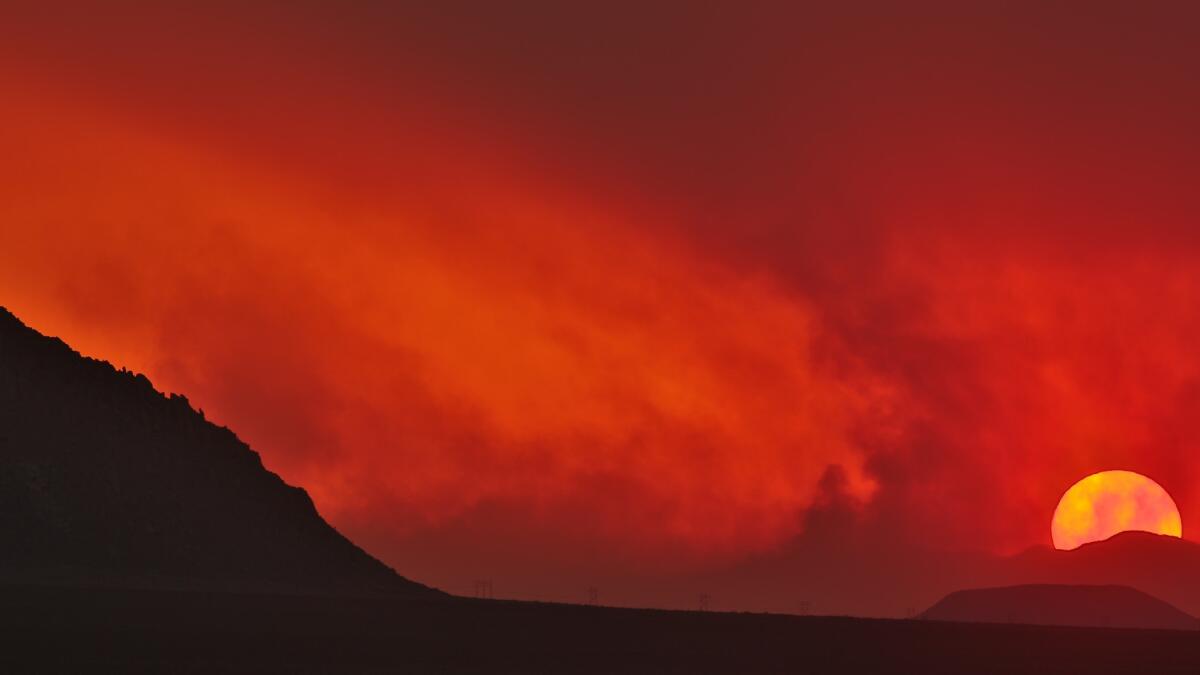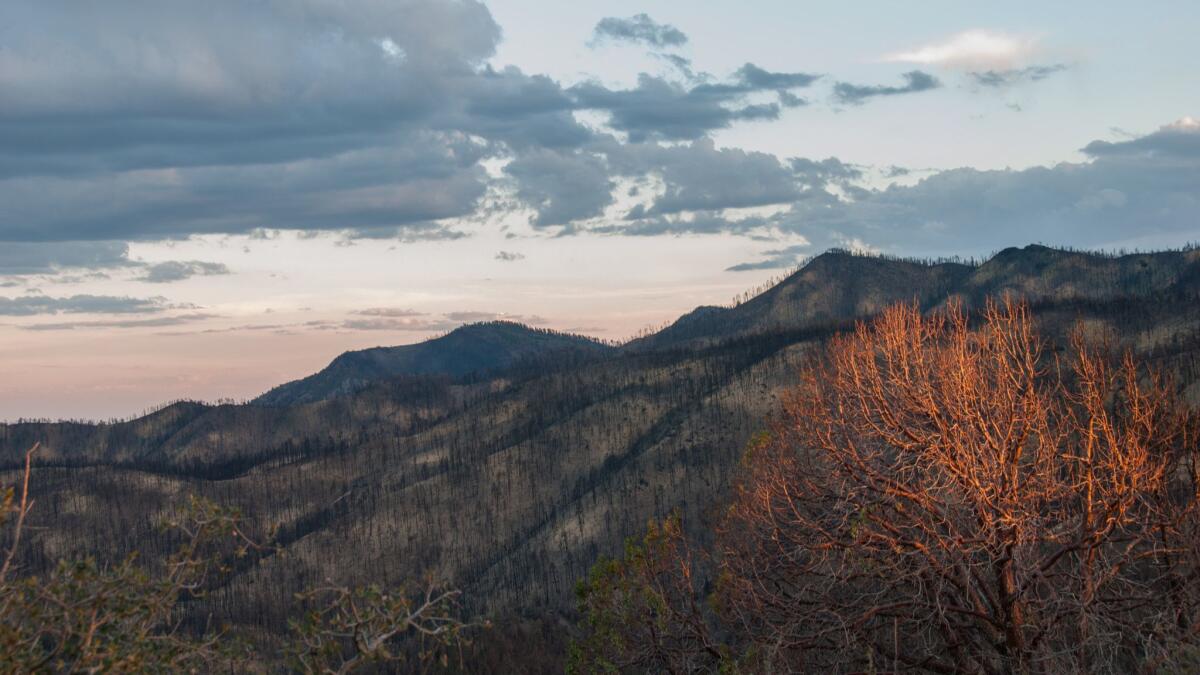Fire lookout Philip Connors’ reckoning in ‘A Song for the River’

- Share via
“Fire Season,” published in 2011, felt like an instant classic. A soulful and surprising mediation on the life of a fire lookout, the book placed Philip Connors on a shelf beside giants of Western literature, including Norman Maclean, Wallace Stegner and Edward Abbey.
A few years later, a second book appeared, “All the Wrong Places,” which seemed quieter and more complicated but no less successful and stirring. This time the focus is on New York, where Connors was a reporter, working to process his younger brother’s devastating suicide.
In Connors’ next book, “A Song for the River” (coming Sept. 18 from Cinco Puntos Press), readers encounter yet another profound and memorable set of pages about personal loss but also — in sweeping and memorable passages — an intense return to the natural and philosophical terrain of the forest and what it’s like to watch it burn.
Tell us how you first came to be a fire lookout.
I was visiting a friend who had the job, back in 2002, around the time I was dreaming of an escape from New York. I had been working for four years by then in a tower in Lower Manhattan. When I saw my friend’s lookout tower, it was immediately evident that her tower better suited me. So I talked myself into her job, flew back to New York to quit the one I had there, and returned to New Mexico, more or less to stay.
It’s hard not to be jealous of a season in a lookout tower, however complex the actual matter of fire suppression.
I think we’d all benefit from some acquaintance with solitude, just to hear the music of our own minds away from the clamor and confusion of our so-called public life. And I think we’d all do well to spend even one minute a day paying attention to creatures other than humans. But I readily admit a fire tower in the wilderness is a bit extreme as far as getaways go.
Your first two books have a lot of the agony and ecstasy of a young man moving through the world. What kind of writer were you this time?
I felt like the reluctant writer of an elegy — sifting through losses I’d rather not have contemplated. The death of a friend. The incineration of a forest. The deaths of young people who inspired me. I began to feel the weight of being fated to write about fire and death.
A lot of great humor balances the heaviness here, such as the moment you remark hopefully that fellow lookout John died “with his boots on.” Then his fiancée notes, wryly, that he was actually wearing sneakers.
It can be surprising what comes out of the shock of grief — sudden moments of manic laughter, for instance. When my friend John died, several of us lookouts came down from our mountains for a long weekend together, and there was so much laughter in those evenings, even amid the tears.
I remember John’s fiancée, Teresa, saying that her first good laugh after his death came when the veterinarian’s office wrote with a card of condolence. “We were so sorry to hear about Sundance,” it said — John’s horse, which also died in the fall. No mention at all of the horse’s rider.
What was your writing process with “ A Song for the River”?
I worked on it for three years, and I took a long time to see it as a book. It began as a short elegy for John in the local newspaper, 800 words or so. But I had a nagging sense I hadn’t said enough, so I wrote a 5,000-word essay and shared it with a few magazines, all of which rejected it. So I let it sit for a while, then went back to work on it, and it became a 10,000-word essay that was published in the magazine n+1. At that point, too, I thought I was done with it, but soon enough it called out to me again.

One of the most affecting passages of the book details what becomes of three high-school teens — friends of yours. I held my breath, nearly sobbing, when you dramatized their final moments.
That was the last part I wrote. It hurt to contemplate their deaths so minutely, and it hurt to get it right, detail by excruciating detail. At so many moments, the story could have turned out differently.
Part of the reason the crash demanded to be part of the story was that the kids’ deaths and John’s death were linked by a wildfire — one that burned up the side of John’s mountain. John and his horse fell to their deaths inside that burn scar, and the kids died in the plane crash because they had been flying over that same burn scar, assessing changes to one of their study transects in the forest. I couldn’t in good conscience honor the one death and not the others.
A lot of supposition and false information sprouted up around the crash in the hometown I shared with John and those students. I wanted to get to the truth — for my own sake, and for the sake of my friends and neighbors.
I didn’t have the stomach to go around interviewing each person involved, making them relive the worst day of their lives, so I spent weeks with the depositions that resulted from a lawsuit over the crash. The whole story was there.
This is a national newspaper: Do you have any words for Interior Secretary Ryan Zinke?
I would urge him to be cognizant of the history of the Gila Wilderness when making any decision about a dam on the Gila River. Also, I would caution him against blaming “environmental terrorist groups” for our wildfire problem. It makes him sound like he’s had a lobotomy.
You’ve never been shy about quoting literary predecessors, from Gary Snyder to Rebecca Solnit, from Herman Hesse to Gertrude Stein.
I owe almost everything to books — whatever intelligence I may possess, whatever facility as a storyteller. The way I see the world is fundamentally determined by what I’ve read. It seems to me natural to acknowledge that. There were moments in the story when it came time to express a thought, and I knew it had been expressed by someone else more eloquently than I could do it. There’s no shame in that.
As you’ve matured as a writer, do you feel more like you’re having a conversation with colleagues, or is there still some anxiety about belonging?
If I had anxiety about belonging, I doubt I’d be tilling ground considered so marginal by the literary world — nature writing and memoir. I’d have moved to Brooklyn and written autofiction about my complicated sexual life, and the joys and sorrows of curating an identity via social media. My concerns have more to do with belonging in the actual world, amid friends and neighbors and creatures in the place I call home.
Deuel is a writer in Los Angeles and author of the memoir “Friday Was the Bomb: Five Years in the Middle East.”
More to Read
Sign up for our Book Club newsletter
Get the latest news, events and more from the Los Angeles Times Book Club, and help us get L.A. reading and talking.
You may occasionally receive promotional content from the Los Angeles Times.






